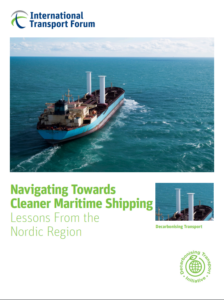The International Transport Forum (ITF) issued a report which analyzes prospects for energy use in the Nordic shipping sector and outlines potential solutions that could allow the region to pro-actively respond to the imperatives of energy diversification, the reduction of local pollutants and the abatement of greenhouse gas (GHG) emissions.
In general, the report focuses on pathways that could allow the Nordic shipping sector to meet energy and environmental policy goals, including energy diversification, cutting air pollution and reducing greenhouse gas emissions. It details the feasible technology options currently available, the status of their adoption and government plans aimed at influencing future developments in this sector. Finally, it assesses implications for policy making for a rapid transition to cleaner maritime shipping. The report focused on alternative fuels that will contribute to the GHG reduction in the Nordic shipping sector. It is highlighted that readily available technologies can unlock efficiency improvements and are an urgent priority. These technologies are an essential pillar of a transition to low-carbon shipping and the competitiveness of maritime transport – notably if a switch to low-carbon fuels increases energy costs. Promising efficiency improvements include wind assistance technologies and skin friction improvements via reduced hull fouling and hull air lubrication. Other energy efficiency savings can continue to come from increases in ship capacity – provided that capacity utilisation does not decline – and slow steaming. Concerning the use of LNG and methanol (when produced using fossil fuels) the report revealed that the two fuels do not deliver, in current conditions, significantly lower GHG emissions than conventional marine fuels. Current policies focus on direct CO2 emissions and do not account for other GHG emissions such as methane or emissions from upstream fuel production. This limitation creates inappropriate advantages for fuels such as fossil LNG, as its main benefit of relatively low direct CO2 emissions is offset by relatively high well-to-wake GHG emissions. Additionally, the use of onshore power can help to reduce marine oil consumption and alleviate air pollution in ports. It is noted that The adoption of alternative fuels will require close cooperation throughout supply chains between shipowners, operators, ports, fuel producers and distributors as well as legislators. Recommendations To learn more click on the report herebelow
































































